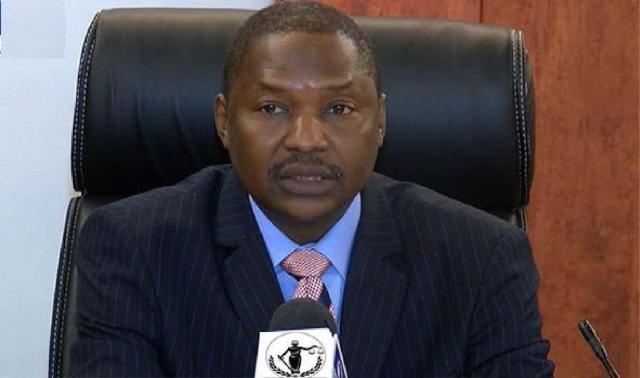Attorney-General of the Federation and Minister of Justice, Abubakar Malami (SAN) says he didn’t blame the judiciary for delays in the prosecution of high-profile cases.
Malami made this known in a statement by Dr. Umar Gwandu, his Special Assistant on Media and Public Relations in Abuja on Wednesday.
Malami was reacting to the press statement by the Chief Justice of Nigeria (CJN), which in turn was a reaction to suggestions that the Judiciary was responsible for delays in the prosecution of high-profile cases.
Read Also: Fuel scarcity: We’ll restore normalcy in Abuja, others in 3 days – FG
Malami said the President Muhammadu Buhari-led Government accords respect to the democratic provisions of the doctrine of separation of powers among the three independent and separate arms of government.
The minister noted with dismay the way his response to a question in a recent interview was construed to evoke an unintended and non-existing inferences which some mischief makers projected him as blaming the judiciary.
“It was an innocent statement aimed at showing and re-enactment of tripartite division of powers and responsibilities among the Executive, Legislature and Judiciary,” he said.
Malami said the Federal Government maintained the sanctity of the provisions of sections 4, 5 and 6 of the 1999 Constitution of the Federal Republic of Nigeria that delineate the roles and responsibilities of the executives, legislature and judiciary.
“It is on this note that the Federal Government supported the review of Section 121(3) of the Constitution of the Federal Republic of Nigeria to accommodate the provisions for financial autonomy of the state legislature and judiciary.
“In addition to the Constitutional provisions, the Federal Government also came up with the Executive Order 10 to enforce the provision of autonomy of State Legislature and Judiciary.
“It is on the record that the Buhari-led Federal Government has a record of non-interference with or meddling into the affairs of the legislature and judiciary”.
He said that it was within the context of the quality and feature of non-interference by the Buhari-led Federal government and for the avoidance of sub-judice that he responded that high-profile cases were presented by the Federal Government for prosecution and the government came out with initiatives in its efforts to support speedy determination of justice.
“This position was in consistent with the decision of the Court of Appeal in Hon. Abdullahi Maccido Ahmad v. Sokoto State House of Assembly & Anor, (2002) 44 WRN 52 where the Court Per Salami JCA held inter alia that;
“The doctrine of separation of powers has three implications: that the same person should not be part of more than one of the arms or division of government;
“That one branch should not dominate or control another arm. This is particularly important in the relationship between (the) executive and the courts;
“That one branch should not attempt to exercise the function of the other…”
The Minister said in view of the crucial role of the judiciary as an essential element of democratic system, the Federal Government gives attention to the budgetary provisions of the Judiciary in addition to welfare-packages meant to enhance their operations.



Leave a Reply